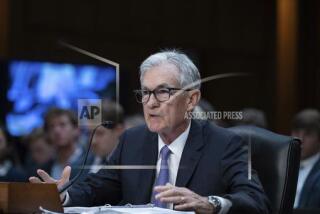Fed officials appear ready for another interest rate hike and are considering how to reduce assets

Reporting from Washington — Most Federal Reserve monetary policymakers indicated they were ready for another small interest rate hike — perhaps as soon as next month — if economic data strengthened as expected following a weak winter, according to an account released Wednesday of their most recent meeting.
Fed officials also considered a plan to start reducing the $4.5 trillion in Treasury and mortgage securities and other assets the central bank has purchased since 2008 in an attempt to stimulate the economy.
The plan, which they said likely would begin later this year, would involve slowly allowing some of the maturing securities to be cashed in instead of reinvesting the money in new securities, the meeting minutes showed.
The goal would be to avoid roiling financial markets and causing interest rates to jump.
Such a plan would take place if the Fed continued to nudge up its benchmark short-term interest rate this year, according to the minutes. And despite the economy’s slow growth over the winter, policymakers indicated they were on pace to do so.
Analysts said the minutes showed the Fed remained on track for at least two more rate hikes this year, with the first one likely coming next month.
Ian Shepherdson, chief economist at Pantheon Macroeconomics, said Wednesday he expects “hikes in June, September and December.”
A couple of Fed officials had indicated a rate increase at the May 2-3 meeting would have been “warranted” but agreed to hold off, the minutes showed.
The Fed voted unanimously at that meeting to hold the rate target steady at between 0.75% and 1%. The policymaking committee’s official statement downplayed the weak data, including a sharp slowdown in economic growth in the first quarter, as “likely to be transitory.”
Minutes of the meeting, released with the usual three-week delay, said that policymakers “generally judged that it would be prudent to await additional evidence that the recent slowing in the pace of economic activity had been transitory” before hiking the rate again.
The first sign of that came two days later when the Labor Department reported that job growth had rebounded strongly in April.
The economy added 211,000 net new jobs, up from 79,000 in March. The unemployment rate fell to 4.4%, the lowest in nearly a decade.
Economists expect the economy to pick up this spring after expanding at an anemic 0.7% annual rate from January through March. Forecasts call for an annual growth rate of about 3% in the second quarter.
On Tuesday, Patrick Harker, the president of the Federal Reserve Bank of Philadelphia, said a rate hike at the Fed’s June 13-14 meeting was “a distinct possibility.”
Before the May meeting minutes were released, investors put the odds of a 0.25% rate hike next month at 83%, according to the FedWatch tool of the CME Group futures exchange.
As much as investors were looking for signs of the next rate hike in the minutes, they also are awaiting word from the Fed on how it plans to reduce the assets on its balance sheet.
The amount of assets soared from about $925 billion before the 2008 financial crisis hit as the Fed started to buy securities to try to stimulate the economy. The intent of purchasing Treasury securities and mortgage-backed bonds was to increase money supply and drive down longer-term interest rates.
At the May meeting, Fed staffers briefed policymakers on a plan to reduce those holdings “in a gradual and predictable manner.”
The plan calls for the Fed to initially set a low cap for the dollar amount of maturing securities that would be allowed to run off each month. The cap would be raised every three months. Nearly all Fed policymakers “expressed a favorable view” of that approach, the minutes said.
Twitter: @JimPuzzanghera
UPDATES:
1:20 p.m.: This article was updated with comment from Ian Shepherdson of Pantheon Macroeconomics.
This article originally was published at 11:05 a.m.
More to Read
Inside the business of entertainment
The Wide Shot brings you news, analysis and insights on everything from streaming wars to production — and what it all means for the future.
You may occasionally receive promotional content from the Los Angeles Times.











